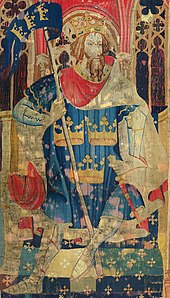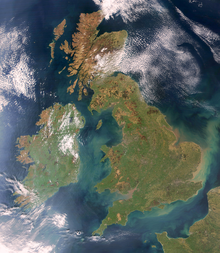| Revision as of 22:47, 12 May 2021 editIffy (talk | contribs)Extended confirmed users, Page movers14,364 edits removed unsourced listcruft, trim see also section, tag what remains of the unsourced section← Previous edit |
Latest revision as of 14:33, 21 August 2024 edit undo82.131.129.247 (talk) updated and extended informationTag: Visual edit |
| (35 intermediate revisions by 27 users not shown) |
| Line 1: |
Line 1: |
|
|
{{Short description|Political ideology and movement}} |
|
{{distinguish|English nationalism}} |
|
{{distinguish|English nationalism}} |
|
] of the United Kingdom, adopted in this version in 1801 bearing the England's red cross with white border (England in 1801 included Wales within it), Ireland's Saint Patrick's Saltire with a white border, and Scotland's Saint Andrew's Saltire and blue background. This is a common symbol used by British nationalists]] |
|
] of the United Kingdom, adopted in this version in 1801 bearing the England's red cross with white border (England in 1801 included Wales within it), Ireland's Saint Patrick's Saltire with a white border, and Scotland's Saint Andrew's Saltire and blue background. This is a common symbol used by British nationalists]] |
| Line 8: |
Line 9: |
|
British nationalism's unifying identity descends from the ] who dwelt on the island of ].<ref name="Guntram H. Herb 2008"/> British nationalism grew to include people outside Great Britain, in ], because of the ], which declared that the crown of Ireland was to be held by the ruling monarch of ] as well as ] calls for unity with Britain.<ref>Brendan Bradshaw, Peter Roberts. British Consciousness and Identity: The Making of Britain, 1533-1707. P. 302.</ref> |
|
British nationalism's unifying identity descends from the ] who dwelt on the island of ].<ref name="Guntram H. Herb 2008"/> British nationalism grew to include people outside Great Britain, in ], because of the ], which declared that the crown of Ireland was to be held by the ruling monarch of ] as well as ] calls for unity with Britain.<ref>Brendan Bradshaw, Peter Roberts. British Consciousness and Identity: The Making of Britain, 1533-1707. P. 302.</ref> |
|
|
|
|
|
It is characterised as a "powerful but ambivalent force in British politics".<ref>{{harvnb|Smith|Smith|White|1988|p=61}}.</ref> In its moderate form, British nationalism has been a ], emphasizing both cohesion and diversity of the people of the United Kingdom, its dependencies, and its former colonies.{{sfn|Motyl|2001|pp=64}} However, ] nationalism has arisen based on fear of Britain being swamped by immigrants; this ] nativist nationalism has manifested politically in the ] and other nativist nationalist movements.{{sfn|Motyl|2001|pp=64}} Politicians, such as former ] ], have sought to promote British nationalism as a progressive cause.<ref>Conservative Party leader David Cameron advocates liberal or civic British nationalism: {{cite web |quote=Being British is one of the most successful examples of inclusive civic nationalism in the world. |title=Cameron: I will never take Scotland for granted |url=http://www.conservatives.com/News/Speeches/2006/09/Cameron_I_will_never_take_Scotland_for_granted.aspx |archive-url=https://web.archive.org/web/20120924062357/http://www.conservatives.com/News/Speeches/2006/09/Cameron_I_will_never_take_Scotland_for_granted.aspx |archive-date=24 September 2012 |website=Conservatives |date=15 September 2006}} The official party site.</ref> |
|
It is characterised as a "powerful but ambivalent force in British politics".<ref>{{harvnb|Smith|Smith|White|1988|p=61}}.</ref> In its moderate form, British nationalism has been a ], emphasizing both cohesion and diversity of the people of the United Kingdom, its dependencies, and its former colonies.{{sfn|Motyl|2001|pp=64}} However, ] nationalism has arisen based on fears relating to immigration; this ] nativist nationalism has manifested politically in the ] and other nativist nationalist movements.{{sfn|Motyl|2001|pp=64}} Politicians, such as former ] ], have sought to promote British nationalism as a progressive cause.<ref>Conservative Party leader David Cameron advocates liberal or civic British nationalism: {{cite web |quote=Being British is one of the most successful examples of inclusive civic nationalism in the world. |title=Cameron: I will never take Scotland for granted |url=http://www.conservatives.com/News/Speeches/2006/09/Cameron_I_will_never_take_Scotland_for_granted.aspx |archive-url=https://web.archive.org/web/20120924062357/http://www.conservatives.com/News/Speeches/2006/09/Cameron_I_will_never_take_Scotland_for_granted.aspx |archive-date=24 September 2012 |website=Conservatives |date=15 September 2006}} The official party site.</ref> |
|
|
|
|
|
==Nationalism and unionism== |
|
==Nationalism and unionism== |
|
⚫ |
Nowadays, as in the past, unionist movements exist in ], ] and ]. These movements seek specifically to retain the ties between those areas and the rest of the ], in opposition to civic nationalist movements. Such unionist movements include the ], ] and the ]. In ] and ] the ], ], ], and ] support the Union. British nationalists are generally supportive of unionism. |
|
{{unsourced section}} |
|
|
|
|
| ⚫ |
Nowadays, as in the past, unionist movements exist in ], ] and ]. These movements seek specifically to retain the ties between those areas and the rest of the ], in opposition to civic nationalist movements. |
|
|
|
==List of British nationalist parties== |
|
|
* British Commonwealth Party |
|
|
* ] |
|
|
* ] |
|
|
* ] |
|
|
* ] |
|
|
* ] |
|
|
* ] |
|
|
* ] |
|
|
* ] |
|
|
* ] |
|
|
* ] |
|
|
* ] |
|
|
*] |
|
|
|
|
|
==See also== |
|
==See also== |
|
|
* ] |
|
|
* ] |
|
* ] |
|
* ] |
|
* ] |
|
* ] |
| Line 27: |
Line 44: |
|
* ] |
|
* ] |
|
* ] |
|
* ] |
|
|
* ] |
|
|
|
|
|
==References== |
|
==References== |
It is characterised as a "powerful but ambivalent force in British politics". In its moderate form, British nationalism has been a civic nationalism, emphasizing both cohesion and diversity of the people of the United Kingdom, its dependencies, and its former colonies. However, nativist nationalism has arisen based on fears relating to immigration; this anti-immigrant nativist nationalism has manifested politically in the British National Party and other nativist nationalist movements. Politicians, such as former British prime minister David Cameron, have sought to promote British nationalism as a progressive cause.



